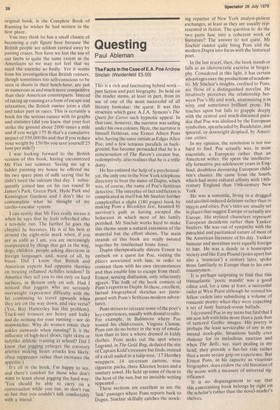Questing
Paul Ableman
The Facts in the Case of E.A. Poe Andrew Sinclair (Weidenfeld £5.50) This is a rich and fascinating hybrid work — part fiction and part biography. Its hold on the reader stems, at least in part, from its use of one of the most successful of all literary formulae: the quest. It was this structure which gave A.J.A. Symons's The Quest for Corvo such hypnotic appeal. In that case, however, the narrator was sailing under his own colours. Here, the narrator is himself fictitious, one Ernest Albert Pons who, having the same initials as Edgar Allen Poe, and a few tenuous parallels in background, has become persuaded that he is a reincarnation of The Raven's creator but, redemptively, also realizes that he is a trifle dotty.
He has enlisted the help of a psychoanalyst, the only one in the New York telephone directory to bear the name of Dupin, which was, of course, the name of Poe's fictitious detective. The interplay of fact and-fiction is complicateclin itself.but Mr Sinclair further complexifies a slight (180 pages) book by making Pons a Brooklyn Jew, haunted by survivor's guilt at having escaped the holocaust in which most of his family perished. Mr Sinclair works hard to make this theme seem a natural extension of the material but the effort shows. The main strands of this book are really twisted together by intellectual brute force.
Dupin therapeutically directs Ernest to embark on a quest for Poe, visiting the places associated with him, in order to contrast them with his own circumstances and thus enable him to escape from thrall. Ernest, sensing disillusion, only reluctantly agrees. The bulk of the book consists of Pons's reports to Dupin. In these, excellent, factual biographical sketches are juxtaposed with Pons's fictitious modern adventures.
Pons strives to recreate some of the poet's key experiences, usually with dismal results. For example, in Baltimore where Poe wooed his child-cousin, Virginia Clemm, Pons can do no better in the way of emulation than to hire a whore dressed in kiddy clothes. Pons seeks out the spot where Legrand, in The Gold Bug, deduced the site of Captain Kidd's treasure but finds, instead of a skull nailed to a tulip-tree, '17 Hershey wrappers, 14 ice-cream cartons, nine cigarette packs, three Kleenex boxes and a sanitary towel. He held up some of them to the heat of the sun, but no invisible writing appeared. .. These sections are excellent as are the 'link' passages where Pons reports back to Dupin. Sinclair skilfully catches the mock ing repartee of New York analyst-patient exchanges, at least as they are usually represented in fiction. The question is: do the two parts fuse into a coherent work of literature? The answer is: not quite. Mr Sinclair cannot quite bring Pons and the modern Dupin into focus with the historical poet.
In the last resort, then, the book stands or falls as an idiosyncratic exercise in biography. Considered in this light, it has certain advantages over the productions of academics. Mr Sinclair's insights, credited to Pons, are those of a distinguished novelist. He intuitively perceives the relationship between Poe's life and work, anatomising it in witty and sometimes brilliant prose. He touches upon but fails to grapple deeply with the central and much-discussed paradox that Poe was idolized by the European symbolists, spearheaded by Baudelaire, and ignored, or downright despised, by American critics.
In my opinion, the resolution is not too hard to find. Poe actually was, in most essentials, a European rather than an American writer. He spent the intellectually formative pre-adolescent years in England, doubtless devouring European children's classics. He came from the South, which had more cultural affinity with 18thcentury England than 19th-century New York.
He was a romantic., living in.a drugged and alcohol-induced delirium rather than in streets and cities. Poe's tales are usually set in places that suggest Europe or actually are Europe. His stylized characters represent European decadents rather than Yankee hustlers. He was out of sympathy with the parochial and puritanical nature of most of the American literature of his day. Yankee humour and moralism were equally foreign to him. He was a dandy in a homespun society and like Ezra Pound (poles apart but also a 'musician') a century later, spoke more familiarly to Europe than to his own countrymen.
It is perhaps surprising to find that this transatlantic 'poete maudit' was a good editor and, for a time at least, a successful cadet at West Point although he conned his fellow cadets into subsidising a volume of romantic poetry when they were expecting a set of lusty barrack-room ballads.
I devoured Poe in my teens but find that I am now left with little more than a junk-box of tattered Gothic images. His poetry is perhaps the least serviceable of any in my mental stock-pile. Situations hardly ever clamour for its melodious sanction and when The Bells, say, start pealing in my head, they provide a fun-fair ride rather than a more secure grip on experience. But Ernest Pons, in his capacity as vicarious biographer, does endow the old historian of the worm with a measure of universal significance.
It is no disparagement to say that this entertaining book belongs by right on the scholar's rather than the novel-reader's shelves.






































 Previous page
Previous page